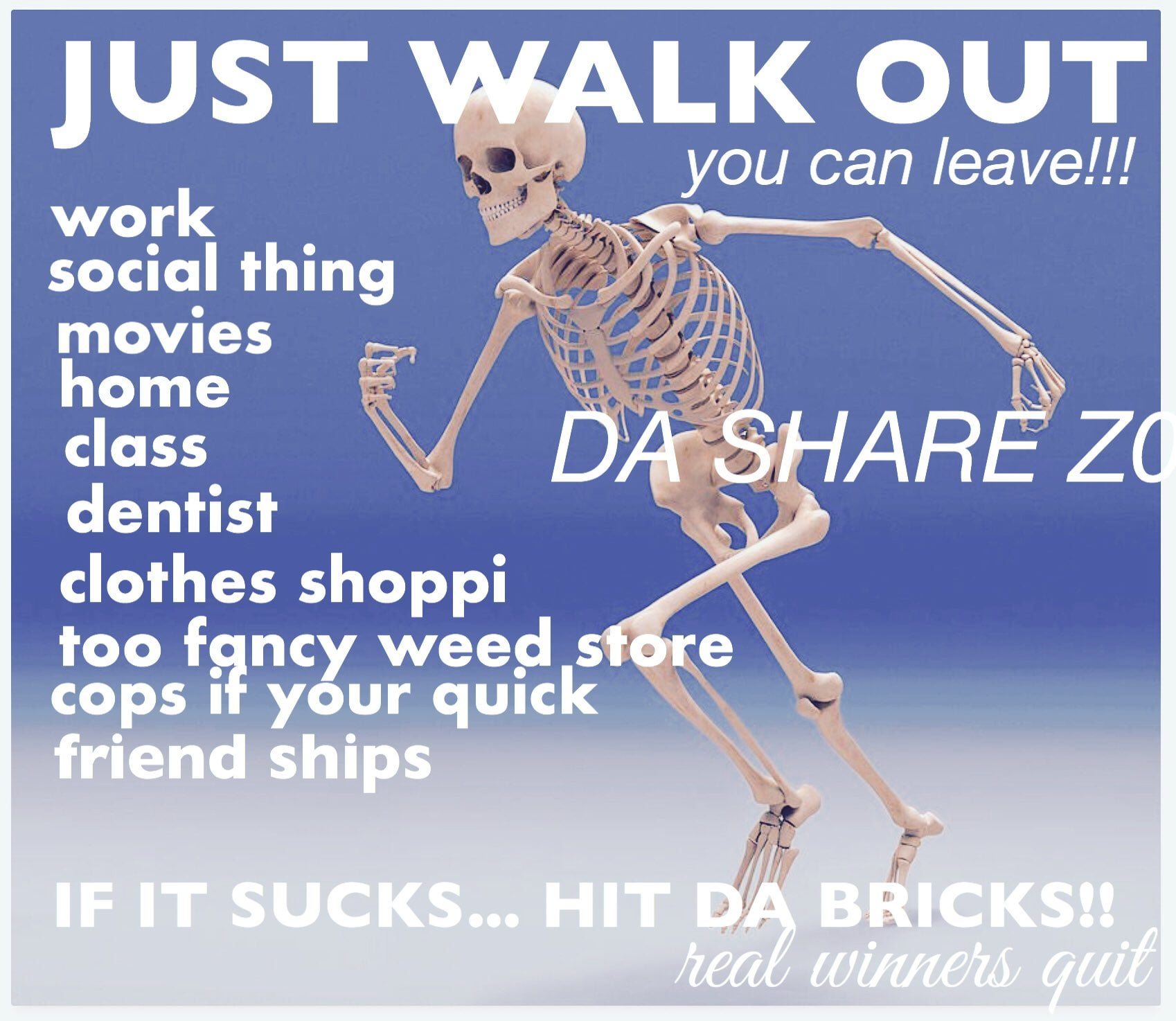You never have to do anything. You always have a choice.
Always, even in situations where everything seems hopeless and you’re stuck in a corner- always, there is something you can do. It might not be pleasant. It might really, really suck. But it can be done if you decide that it’s worth a try. Bust through the wall, jump out a window, and consider the choices that were too absurd for you to consider before.
If inaction means guaranteed harm and acting means a chance of harm, then it’s time to act. If leaving gives you a chance at improvement and staying keeps you miserable, then it’s time to leave. You have control over your destiny; staying in the corner and dying is just as much a choice as fighting to live.
If you catch yourself thinking “well, there’s nothing I can do about it, might as well give up and die”, then stop for a minute and think outside the box:
- Can you leave or take a break?
- Can you ask for help?
- Can you refuse to cooperate?
- Can you fight back?
- What actions seem too painful, absurd, or exhausting to try?
- Is painful or difficult change really worse than a situation that’s left you actively considering death as a way out?
Couch surfing or being homeless can be better than living in an abusive home. Getting fired can be better than putting up with discrimination at work. Leaving is always an option. So is fighting back or refusing to cooperate. Suicidal? Radical life changes are better than dying. Anything is on the table.
Yes, people might get mad at you. They might hurt you. There might be consequences. You might regret it. That doesn’t mean you can’t do something; it means that there’s risk, but it’s possible. You still have that option.
I might not know you, but I’m asking you to get out of the corner and fight for a life worth living. Get up. Do Something.

I believe it is critical for a woman to view staying as a choice, for only then can leaving be viewed as a choice and an option.
Gavin J. Becker, The Gift of Fear
You don’t know anyone at the party, so you don’t want to go. You don’t like cottage cheese, so you haven’t eaten it in years. This is your choice, of course, but don’t kid yourself: it’s also the flinch. Your personality is not set in stone. You may think a morning coffee is the most enjoyable thing in the world, but it’s really just a habit. Thirty days without it, and you would be fine. You think you have a soul mate, but in fact you could have had any number of spouses. You would have evolved differently, but been just as happy.
You can change what you want about yourself at any time. You see yourself as someone who can’t write or play an instrument, who gives in to temptation or makes bad decisions, but that’s really not you. It’s not ingrained. It’s not your personality. Your personality is something else, something deeper than just preferences, and these details on the surface, you can change anytime you like.
If it is useful to do so, you must abandon your identity and start again. Sometimes, it’s the only way.
Set fire to your old self. It’s not needed here. It’s too busy shopping, gossiping about others, and watching days go by and asking why you haven’t gotten as far as you’d like. This old self will die and be forgotten by all but family, and replaced by someone who makes a difference.
Your new self is not like that. Your new self is the Great Chicago Fire—overwhelming, overpowering, and destroying everything that isn’t necessary.
Julien Smith, The Flinch, 2011
Freedom can be willed because it is your own decision to remain in a prison. It is your own responsibility. You have willed your slavery, you have decided to remain a slave, hence you are a slave. Change the decision, and the slavery disappears.
You have invested in your unfreedom. Any moment you see the point, you can drop it; instantly it can be dropped. Nobody has forced unfreedom on you, it is your choice. You can choose to be free, you can choose to be unfree; you are so free that you can choose either. This is part of your inner freedom – not to choose it is part of your freedom. Hence it can be willed.
When one is totally dissolved into freedom and when one is really free, the ego disappears. The ego is your bondage; the ego is your prison. In total freedom there is no ego found. Surrender happens, you start feeling one with existence – and that oneness brings Love.
Bhagwan Shree Rajneesh (Osho), The Book of Wisdom (Chapter 26), 1979
See also: Refusal To Act Is Still A Choice